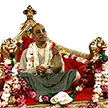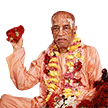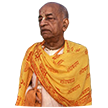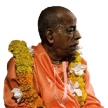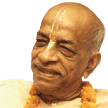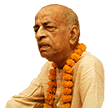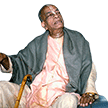Isvara - an essential subject: Difference between revisions
(Created page with "Category:Essential Subjects <!----------------------- edit below this line -----------------------> <!------------------------ begin introduction text below --------------...") |
(Vanibot #0041: Moves Choose Another box to the end) |
||
| Line 2: | Line 2: | ||
<!----------------------- edit below this line -----------------------> | <!----------------------- edit below this line -----------------------> | ||
<!------------------------ begin introduction text below ------------------------> | <!------------------------ begin introduction text below ------------------------> | ||
Lord Śiva is full of wisdom and tapasya, austerity. One who knows the modes of work is understood to be situated on the path of devotional service to the Supreme Personality of Godhead. One cannot serve the Supreme Personality of Godhead unless one has achieved full perfectional knowledge in the ways and means of performing devotional service. Lord Śiva is described here as adhīśvara. Īśvara means "controller," and adhīśvara means particularly "controller of the senses." Generally our materially contaminated senses are apt to engage in sense gratificatory activities, but when a person is elevated by wisdom and austerity, the senses then become purified, and they become engaged in the service of the Supreme Personality of Godhead. The real īśvara or īśvaraḥ paramaḥ, the supreme īśvara, or supreme independent, is Kṛṣṇa. The living entity is īśvara only when engaged in the service of the Lord. In other words, transcendental pleasure derived from loving service to the Lord is actual independence. | |||
Srila Prabhupada's books, lectures, conversations and letters offer a comprehensive presentation of this essential subject as seen in the Vaniquotes '''[[Vaniquotes:Category: | Srila Prabhupada's books, lectures, conversations and letters offer a comprehensive presentation of this essential subject as seen in the Vaniquotes '''[[Vaniquotes:Category:Isvara|Isvara]]''' category. An introduction from his books is given below in the following 8 quotes. | ||
<!-------- end introduction text and don't touch next three lines ---------> | <!-------- end introduction text and don't touch next three lines ---------> | ||
== Quotes from Srila Prabhupada's books == | == Quotes from Srila Prabhupada's books == | ||
<!----------------- edit quote boxes below this line -----------------> | <!----------------- edit quote boxes below this line -----------------> | ||
{{VaniQuotebox| | {{VaniQuotebox|Everyone may be accepted as an isvara, or controller, but still such controllers are controlled by others. For example, one may have undergone severe austerities but still be under the control of anger|Everyone may be accepted as an īśvara, or controller, but still such controllers are controlled by others. For example, one may have undergone severe austerities but still be under the control of anger. By a scrutinizing analysis, we find that everyone is controlled by something else. No one, therefore, can be the true controller but the Supreme Personality of Godhead, Kṛṣṇa. '''(Śrīmad-Bhāgavatam 8.8.20)'''}} | ||
{{VaniQuotebox| | {{VaniQuotebox|Here the living entity is described as isvara, the controller of his own body. If he likes, he can change his body to a higher grade, and if he likes he can move to a lower class| The living entity is described as īśvara, the controller of his own body. If he likes, he can change his body to a higher grade, and if he likes he can move to a lower class. Minute independence is there. The change his body undergoes depends upon him. At the time of death, the consciousness he has created will carry him on to the next type of body. If he has made his consciousness like that of a cat or dog, he is sure to change to a cat's or dog's body. '''(Bhagavad-gītā 15.8)'''}} | ||
{{VaniQuotebox| | {{VaniQuotebox|If there were no one to control, there would be no meaning to the conception of the supreme controller (isvara), just as there is no meaning to a king without his subjects|If the Personality of Godhead did not possess both limited and unlimited energies, He could not be called omnipotent. Aṇor aṇīyān mahato mahīyān: "The Lord is smaller than the smallest and greater than the greatest." He is smaller than the smallest in the form of the living entities and greater than the greatest in His form of Kṛṣṇa. If there were no one to control, there would be no meaning to the conception of the supreme controller (īśvara), just as there is no meaning to a king without his subjects. '''(Caitanya-caritāmṛta, Ādi-līlā 7.116)'''}} | ||
{{VaniQuotebox| | {{VaniQuotebox|In pure consciousness, our actions will be dovetailed to the will of isvara, and that will make us happy. It is not that we have to cease all activities. Rather, our activities are to be purified, and purified activities are called bhakti|In pure consciousness, our actions will be dovetailed to the will of īśvara, and that will make us happy. It is not that we have to cease all activities. Rather, our activities are to be purified, and purified activities are called bhakti. Activities in bhakti appear to be like ordinary activities, but they are not contaminated. An ignorant person may see that a devotee is acting or working like an ordinary man, but such a person with a poor fund of knowledge does not know that the activities of the devotee or of the Lord are not contaminated by impure consciousness or matter. '''(Bhagavad-gītā Introduction)'''}} | ||
{{VaniQuotebox| | {{VaniQuotebox|Karma is not eternal. Therefore we stated that of the five items (isvara, jiva, prakrti, time and karma) four are eternal, whereas karma is not eternal|As the soul thus migrates, he suffers the actions and reactions of his past activities. These activities can be changed when the living being is in the mode of goodness, in sanity, and understands what sort of activities he should adopt. If he does so, then all the actions and reactions of his past activities can be changed. Consequently, karma is not eternal. Therefore we stated that of the five items (īśvara, jīva, prakṛti, time and karma) four are eternal, whereas karma is not eternal. '''(Bhagavad-gītā Introduction)'''}} | ||
{{VaniQuotebox| | {{VaniQuotebox|Krsna is also mentioned as isvara, the supreme controller who is situated in everyone's heart. Therefore, if some way or other we become attached to Krsna, He will make us free from all danger|Kṛṣṇa is also mentioned as īśvara, the supreme controller who is situated in everyone's heart. Therefore, if some way or other we become attached to Kṛṣṇa, He will make us free from all danger. In Bhagavad-gītā it is said that anyone who becomes a devotee of the Lord is never vanquished. Others, however, are always vanquished. "Vanquished" means that after getting this human form of life, a person does not come out of the entanglement of birth and death and thus misses his golden opportunity. '''(Nectar of Devotion 2)'''}} | ||
{{VaniQuotebox| | {{VaniQuotebox|Krsna is the supreme controller (isvarah paramah krsnah). and His body is sac-cid-ananda, nonmaterial|Each of them is a controller, but one is controlled by another. In the Brahma-saṁhitā it is said that Kṛṣṇa is the supreme controller; there are many controllers undoubtedly, both in the material and spiritual world, but Kṛṣṇa is the supreme controller (īśvaraḥ paramaḥ kṛṣṇaḥ). and His body is sac-cid-ānanda, nonmaterial. '''(Bhagavad-gītā 9.11)'''}} | ||
{{VaniQuotebox| | {{VaniQuotebox|Lord Brahma and Lord Siva are isvaras, great controllers, but Lord Visnu is paramesvara, the supreme controller|Lord Viṣṇu, Lord Brahmā and Lord Śiva are the supreme controllers of this universe, but Lord Viṣṇu is offered obeisances even by Lord Śiva and Lord Brahmā. Therefore this verse uses the word pareśāya, which indicates that the Supreme Personality of Godhead is worshiped by exalted demigods. Pareśāya means parameśvara. Lord Brahmā and Lord Śiva are īśvaras, great controllers, but Lord Viṣṇu is parameśvara, the supreme controller. '''(Śrīmad-Bhāgavatam 8.3.2)'''}} | ||
<!----------------- edit quote boxes above this line -----------------> | <!----------------- edit quote boxes above this line -----------------> | ||
''' | '''Isvara - [[Vaniquotes:Category:Isvara|explore more within this category]]'''. | ||
{{EsentialSubjectTotal}} | {{EsentialSubjectTotal}} | ||
<div style="float:left;"> | |||
{{EssentialSubjectnav}} | |||
</div> | |||
__NOTOC__ | __NOTOC__ | ||
__NOEDITSECTION__ | __NOEDITSECTION__ | ||
Latest revision as of 16:36, 22 November 2020
Lord Śiva is full of wisdom and tapasya, austerity. One who knows the modes of work is understood to be situated on the path of devotional service to the Supreme Personality of Godhead. One cannot serve the Supreme Personality of Godhead unless one has achieved full perfectional knowledge in the ways and means of performing devotional service. Lord Śiva is described here as adhīśvara. Īśvara means "controller," and adhīśvara means particularly "controller of the senses." Generally our materially contaminated senses are apt to engage in sense gratificatory activities, but when a person is elevated by wisdom and austerity, the senses then become purified, and they become engaged in the service of the Supreme Personality of Godhead. The real īśvara or īśvaraḥ paramaḥ, the supreme īśvara, or supreme independent, is Kṛṣṇa. The living entity is īśvara only when engaged in the service of the Lord. In other words, transcendental pleasure derived from loving service to the Lord is actual independence.
Srila Prabhupada's books, lectures, conversations and letters offer a comprehensive presentation of this essential subject as seen in the Vaniquotes Isvara category. An introduction from his books is given below in the following 8 quotes.
Quotes from Srila Prabhupada's books
Isvara - explore more within this category.
Vanipedia has now over 903 introductory articles compiled from Srila Prabhupada's books under the series titled Essential Subjects. All these articles can be seen in the Table of Content on the right side of this article and also here in this Umbrella Category. Browse through them to relish the breadth and depth of Srila Prabhupada's teachings - There is a subject for everyone.
